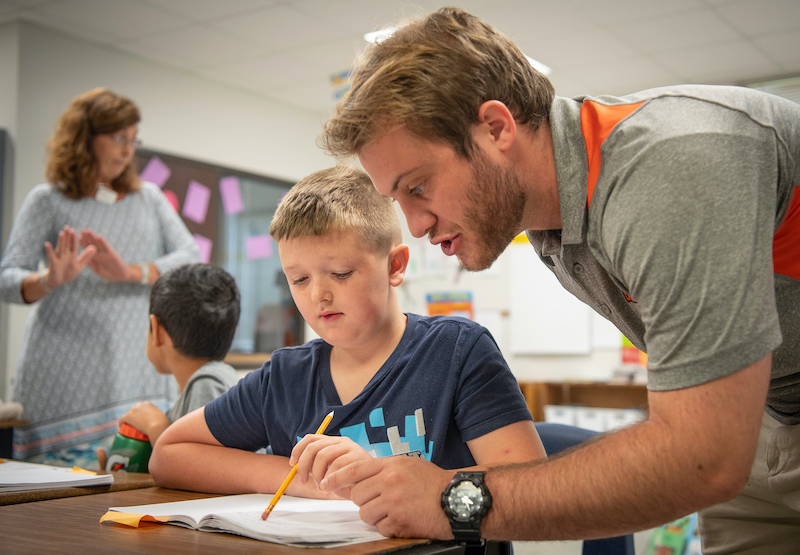-
Academics
- Academics Overview
-
Undergraduate
- Undergraduate Overview
- Agricultural Education
- Early Childhood Education, B.A.
- Elementary Education, B.A.
- Middle Level Education, B.S.
- Mathematics Teaching, B.S.
- Modern Languages Education, B.A.
- Special Education, B.A.
- Secondary Education, B.A.
- Science Teaching, B.S./B.A.
- Athletic Leadership Minor
- Human Capital Education and Development
-
Master's and Specialist Programs
- Master's and Specialist Programs Overview
- Athletic Leadership (Online)
- Counselor Education
- Educational Leadership
- Human Resource Development
- Learning Sciences
- Literacy (Online)
- Middle Level Education, MAT
- Modern Languages, MAT
- Secondary Education, MAT
- Special Education (Online)
- Student Affairs
- Teaching and Learning (Online)
- Teaching and Learning, Ed.S.
- Doctoral Programs
- Certificates | Endorsements | Licensure
- Expressway to Tiger Town
- Bachelor's To Master's | Teacher Residency
- Teaching Fellows
- Research
- Programs
- Students
- About
About the College of Education

Clemson University College of Education is a transformational leader in education across the life-and-career-span. With a particular focus on rural and underserved schools and communities, the college has award-winning programs that prepare teachers, educational specialists, school-and-community-based mental health counselors, human resource professionals and leaders in education and allied fields.
We equip our students for lives and careers that make a difference. Through innovative educational programming, high-impact research and transformative outreach, we respond to critical societal and educational issues, such as workforce development; the role of technology in education and society; teacher recruitment and retention; mental health and well-being and leadership development. We lead these vital initiatives as part of Clemson University’s land-grant mission to serve the state of South Carolina and beyond.
The College of Education includes three academic departments – Education and Human Development; Educational and Organizational Leadership Development; and Teaching and Learning – and the endowed Eugene T. Moore School of Education, home to our renowned Teacher Residency and CU Prepares programs. The School is named for the late Eugene T. Moore, a 1949 graduate of Clemson University who committed his adult life to education as a teacher, coach and principal in Florence County, S.C. In 2002, Eugene’s daughter Darla Moore and her husband Richard Rainwater, gave a $10 million gift to Clemson to name the school in her father's honor.
Teacher Education programs in the College of Education are accredited by the Council for the Accreditation of Education Preparation (CAEP) and the Counselor Education program is accredited by the Council for the Accreditation of Counselor and Related Educational Programs (CACREP). All academic programs at the University are accredited by the Southern Association of Colleges and Schools Commission on Colleges (SACSCOC), and teacher education programs, literacy, and principal and superintendency educational leadership programs curriculum are aligned to their respective professional association standards.
The College of Education is home to several nationally acclaimed programs including Call Me MISTER®, ClemsonLIFE™, Teacher Residency and the Early Literacy Center for South Carolina.
Our Academic Departments
Education and Human Development
Addressing issues within schools and communities, this department offers programs in clinical mental health counseling, learning sciences, literacy, school counseling and special education.
Educational and Organizational Leadership Development
Recognized for excellence across the nation, this department focuses on developing educational and organizational leaders.
Teaching and Learning
This department prepares students who seek to make a difference in their communities – and the world – through careers in curriculum and instruction, early childhood education, elementary education, middle level education and secondary education.
